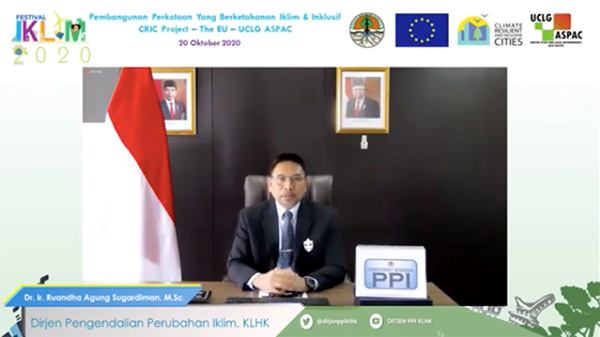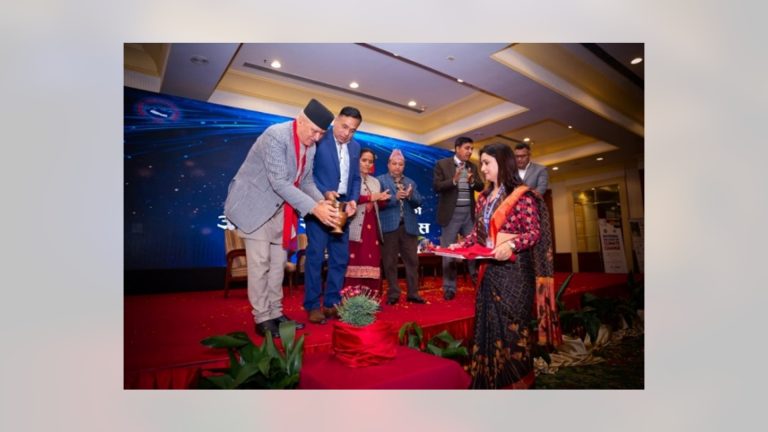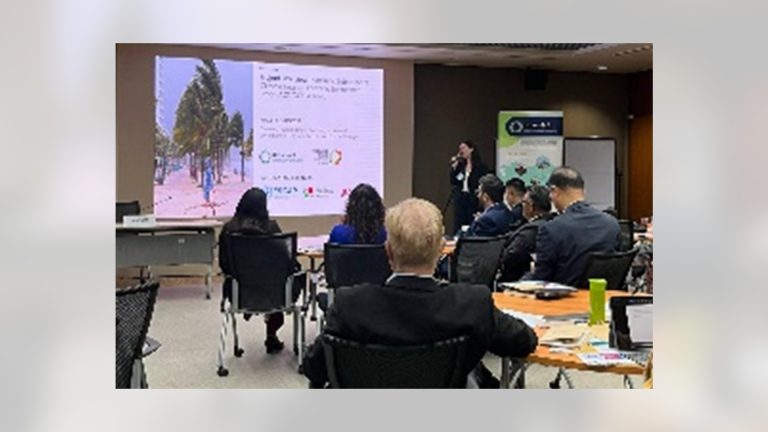20 October 2020 | Jakarta, Indonesia – UCLG ASPAC showcased the commitment of cities in Indonesia made under the Climate Resilient and Inclusive Cities (CRIC) Programme on a webinar taking theme “Climate Resilient and Inclusive Urban Development,” Tuesday, 20 October 2020. The webinar was successfully conducted as part of the Indonesian Ministry of Environment and Forestry’s (MoEF) Climate Festival, with the participation of more than 150 attendants. Participating in this event, UCLG ASPAC expressed its commitment to provide cities with assistance to be climate resilient that contributes to target at the national level. Most importantly, UCLG ASPAC, under the CRIC programme, will also set in motion the growing importance of multi-level governance on climate change.
The MoEF’s Director General of Climate Change Dr. Ruandha Agung Sugardiman opened the webinar, while Henriette Faergemman from the European Union Delegation and UCLG ASPAC’s Dr. Bernadia Irawati Tjandradewi delivered keynote speeches. Speakers of the event included the MoEF’s Climate Adaptation Director Sri Tantri Arundhati, Mayor Marten Taha of Gorontalo, Head of Cirebon Development Planning Agency Iing Daiman, representative of Palembang Environmental Department Nyimas Ida Apriani, early warning system expert from Gustave Eiffel University Professor Youssef Diab and waste management expert from Association of Cities and Regions for Sustainable Resource Management Paolo Marengo.
Dr. Ruandha Agung Sugardiman stated in his opening remarks that climate change is not solely a priority issue, but an obligatory issue as mandated specifically by article 10, 16e and 57 of the Indonesian Law No.32/2009 on Environmental Protection and Management. With this law, it is mandatory for governments, including local governments, to formulate Environmental Protection and Management Plans (RPPLH) that include mitigation and adaptation actions, and to develop Strategic Environmental Assessment. “We hope that CRIC Programme can contribute to government efforts to transform Indonesian cities to be climate resilient, in the forms of strengthened governance, local climate change adaptation actions and early warning system,” he said.
Through CRIC, governments of ten pilot cities will receive technical assistance to develop Climate Action Plans, and to mainstream climate resilience in city policies and planning. The CRIC Programme will also develop waste management, water and sanitation, air pollution and early warning system tools that cities can adopt to address their urban challenges.
Key milestone of the CRIC Project to date is the establishment of a city-level working group consisting of representatives from government and non-government actors. CRIC played a vital role in this by providing working group guidelines to cities and connecting all city stakeholders. Through this working group, CRIC seeks to advance coordination across sectors to work towards common goals. Meanwhile, at a national level, CRIC will facilitate better coordination across relevant ministries to create an enabling environment for climate governance. Consequently, the Programme will contribute to improving vertical integration by ensuring that climate change policies and planning processes at national and sub-national levels are aligned and mutually supportive.
The Secretary General of UCLG ASPAC Dr. Bernadia Irawati Tjandradewi also shared the importance of coordinated actions and holistic approach to tackle climate change. She stated that through CRIC, UCLG ASPAC could help strengthen government coordination at all levels and across sectors to come up with local climate actions. “Multi-stakeholder collaboration is key to building climate-resilient cities. It takes support from the national government, local leadership, community and private sector engagement to achieve the Nationally Determined Contributions (NDC) target. With the network that UCLG ASPAC has, we can also help leverage and replicate climate change best practices from the ten pilot cities to many other cities,” she said.
As part of global communities, Indonesia is not alone in fighting climate change and its consequences. Hence, building a global partnership for climate action is key to achieve the NDC target in the country. CRIC Project that is mainly funded by the European Union, connects cities in Europe, South East Asia and South Asia through training, knowledge sharing and tools promotion. CRIC partners in Europe do their bits by sharing their expertise on sustainable urban development and developing tools for cities. “Only by working together, through commitment and action, EU and Indonesia could meet climate objective and full implementation of the NDC,” says Henriette Faergemann, First Counsellor on Environment, Climate Action and ICT of the European Union Delegation to Indonesia and Brunei Darussalam.
CRIC Programme is a joint commitment of UCLG ASPAC with funding support from the EU. Ten pilot cities in Indonesia, Bandar Lampung, Cirebon, Mataram, Pangkalpinang, Pekanbaru, Samarinda and Ternate, will receive capacity building activities as well as knowledge sharing and transfer from cities in Asia and Europe.











